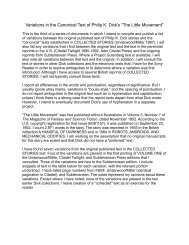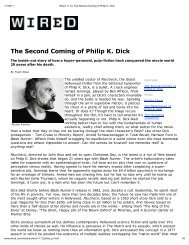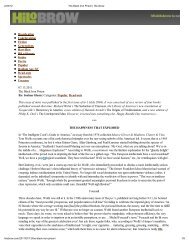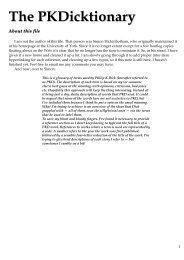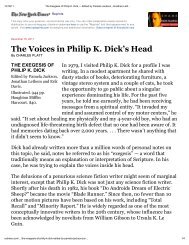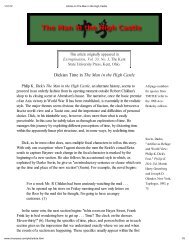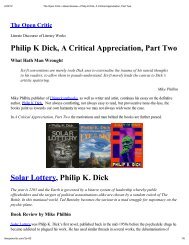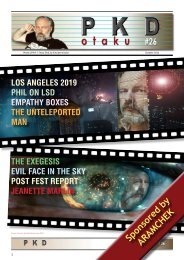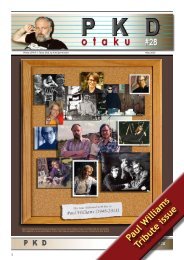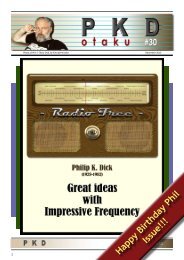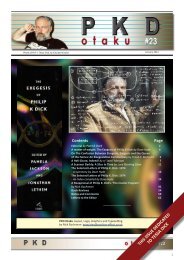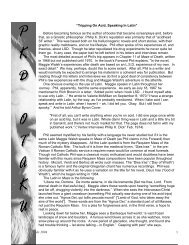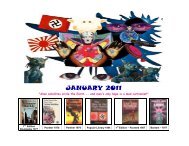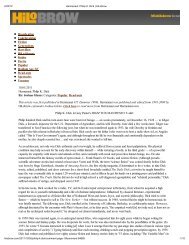PKD Otaku Issue 27 - Philip K. Dick Fan Site
PKD Otaku Issue 27 - Philip K. Dick Fan Site
PKD Otaku Issue 27 - Philip K. Dick Fan Site
You also want an ePaper? Increase the reach of your titles
YUMPU automatically turns print PDFs into web optimized ePapers that Google loves.
<strong>PKD</strong> In His Own Words) therefore seems counterintuitive.<br />
<strong>Dick</strong>’s father, Joseph Edgar <strong>Dick</strong>, is acknowledged<br />
by Rickman (TTHC) as enigmatic in his own right. J. Edgar<br />
<strong>Dick</strong> reports a long American lineage including Irish ancestry<br />
(but no “Scottish” ancestry) in his autobiography<br />
(Rickman, TTHC). But in my research I discovered that<br />
J. Edgar <strong>Dick</strong>’s mother had the surname Mack, a name<br />
found among Pennsylvania Germans associated with<br />
Mennonites and their Anabaptists progenitors.<br />
Alexander Mack was the first prominent<br />
leader of the Church of the Brethren,<br />
an Anabaptist denomination in Pennsylvania<br />
that later produced Martin Brumbaugh,<br />
an expert in pedagogy and a scholar of the<br />
Church of the Brethren who also became<br />
governor of Pennsylvania in 1915. Brumbaugh<br />
was a Freemason. <strong>Dick</strong>s identifying<br />
themselves as Scotch-Irish and <strong>Dick</strong>s claiming<br />
Germanic heritage lived almost side by side<br />
near Indiana, Pennsylvania, from whence J. Edgar<br />
came.<br />
J. Edgar <strong>Dick</strong> (b. 1899) apparently grew<br />
up in a churchgoing home (Rickman, TTHC).<br />
When he was a young man, Germans were<br />
not universally popular in America. Edgar <strong>Dick</strong><br />
may well have had an interest in denying any<br />
Germanic roots when he joined his country’s<br />
military efforts against the Germans in World<br />
War I. If he came from an ostensibly pacifistic<br />
tradition such as that of the Mennonites or<br />
Brethren or Quakers, he may have had all the<br />
more reason to put distance between himself<br />
and his roots.2<br />
The place to which Edgar <strong>Dick</strong>’s father<br />
William moved during Edgar’s childhood-<br />
-Fort Morgan, Colorado--is known as a settlement<br />
of Germans from Russia, and its museum<br />
featured them when I visited <strong>PKD</strong>’s burial place a<br />
decade ago. What was the socio-ethnic-political<br />
atmosphere in which Edgar was raised? Were<br />
there any community pressures facing William<br />
when he moved his family from Pennsylvania to<br />
Colorado, or thereafter? I only scratched the surface<br />
of J. Edgar <strong>Dick</strong>’s lineage. The fact that <strong>PKD</strong><br />
was buried in German-dominated cattle-ranching<br />
and cattle-butchering country, though not<br />
far from the Wyoming location of the fictional<br />
“Man in the High Castle,” stands in seeming<br />
contradiction to a life which ended with no<br />
discernible strong links to family.<br />
Might J. Edgar <strong>Dick</strong> have had motives<br />
for creating a new identity for himself? J.<br />
Edgar was educated at Georgetown University,<br />
a training ground for intelligence<br />
agents, and his first employment was with the federal<br />
government. <strong>Dick</strong> apparently served in government-related<br />
or quasi-governmental positions for the rest of his<br />
life, with access to the kind of information on which political<br />
power brokers rely.<br />
Ultimately the elder <strong>Dick</strong> became a person of apparent<br />
behind-the-scenes influence in the State of California.<br />
In primitive cultures, one main indicator<br />
of wealth has been cattle. For most of his<br />
adult life J. Edgar <strong>Dick</strong> was the lobbyist for the<br />
California Cattlemen’s Association: not just<br />
a cattleman, therefore, but a kind of chief of<br />
cattlemen. He effected a kindly but distancing<br />
attitude (Rickman, TTHC) but presumably was<br />
eminently comfortable in the political shark’s<br />
tank of Sacramento. Rickman (TTHC) reports<br />
that Edgar was at his “club” in Chicago when<br />
<strong>Philip</strong> was born. Is it unreasonable to speculate<br />
that J. Edgar, like many well-connected<br />
men of his generation, was a member of a<br />
Masonic or other fraternal lodge?<br />
There has always been some cross-fertilization<br />
between the world of “associations”<br />
and the intelligence community.<br />
Coincidentally, I first learned that there<br />
was an “association of associations” in<br />
the nation’s capital when I met a German<br />
Mennonite WWII veteran who worked<br />
there as a lobbyist (to me he exuded CIA).<br />
Even if J. Edgar <strong>Dick</strong>’s lineage as recounted<br />
by him is substantially accurate, it is plausible<br />
that the Scotch-Irish <strong>Dick</strong>s originated<br />
from the same seed as the Mennonite and<br />
other German <strong>Dick</strong>s and Dycks. Historians<br />
of the esoteric have speculated that some<br />
of those who were to become known as<br />
“Scotch-Irish,” and specifically Scottish Rite<br />
Freemasons, were the descendants of the<br />
Knights Templar who fled to the British<br />
Isles after persecution on the continent.<br />
Just the other week on the Craig<br />
Ferguson Show (CBS), actor Tim Allen<br />
(whose real name is Tim Allen <strong>Dick</strong>)<br />
joked that he had always been told that<br />
he was from Germany but found out after<br />
making a pilgrimage there that he was really<br />
from Scotland. Hello? Is there an echo<br />
in here? I add hastily that I am not aware<br />
of any familial relationship between Tim and<br />
<strong>Philip</strong>.<br />
Without any direct evidence of the influence<br />
“Ted” <strong>Dick</strong> had on his son, the circumstantial<br />
evidence, including one of <strong>PKD</strong>’s short<br />
stories, “The Father-Thing,” is beguiling. For<br />
11<br />
The Dutch reformed church...put an end to ‘sin and corruption,’ and with it, leisure and peace of mind.



